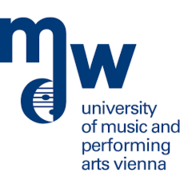Vienna Academy of Music
| Universität für Musik und darstellende Kunst Wien | |
 |
|
|
Former name
|
Hochschule für Musik und darstellende Kunst Wien |
|---|---|
|
Motto in English
|
Tradition and Innovation |
| Type | Public |
| Established | 1817 |
| Rektor | Ulrike Sych |
|
Academic staff
|
850 |
|
Administrative staff
|
200 |
| Students | >3,000 |
| Location | Vienna, Austria |
| Website | www |
The University of Music and Performing Arts Vienna (German: Universität für Musik und darstellende Kunst Wien, abbreviated MDW) is an Austrian university located in Vienna, established in 1817.
Today, with a student body of over three thousand, it is the largest institution of its kind in Austria, and one of the largest in the world.
In 1817, it was established by the Society for the Friends of Music. It has had several names: Vienna Conservatory, Vienna Academy and in 1909 it was nationalized as the Imperial Academy of Music and the Performing Arts. In 1998, the university assumed its current name to reflect its university status, attained in a wide 1970 reform for Austrian Arts Academies.
With a student body of more than 3000, the Universität für Musik und Darstellende Kunst Wien (MDW) is one of the largest arts universities in the world. The university consists of 24 departments including the Max Reinhardt Seminar, Vienna Film Academy and the Wiener Klangstil.
MDW facilities include the Schönbrunn Palace Theater, Antonio Vivaldi Room, Salesian Convent, St. Ursula Church, Lothringerstrasse (Franz Liszt Room) and the Anton Von Webern Platz (university main campus). Modern film studios were completed on the university campus in 2004, offering the Vienna Film Academy state-of-the-art equipment.
The University organizes around 10 competitions, including the International Beethoven Piano Competition. It also presents an acclaimed students’ film festival every two years.
The MDW may be considered a "feeder" institution to all major orchestras in Austria, with a particular association with the Vienna Philharmonic Orchestra.
Calls for a music conservatory in Vienna started in 1808. In 1811 an "outline for a music education institution" for Vienna was published. A year later the Society for the Friends of Music was formed, with the foremost aim of establishing a conservatory. The Vienna Conservatory was founded in 1817. It was meant to be modeled on the Paris Conservatory, but, due to a lack of funds, it began solely as a singing school. Antonio Salieri was the Conservatory's first director. In 1819, it hired violinist Joseph Böhm, and by 1827 offered courses in most orchestral instruments.
...
Wikipedia
